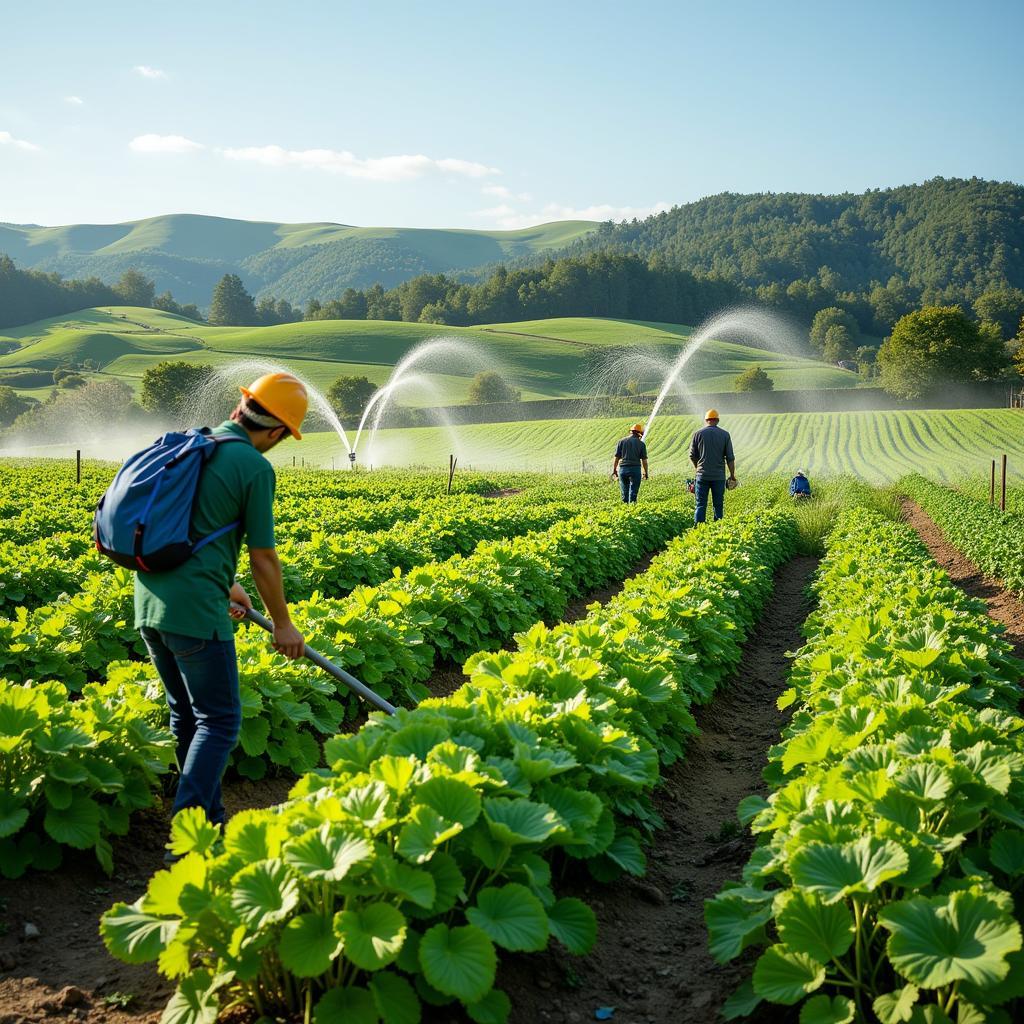Food Alliance Certification is becoming increasingly important in today’s world, as consumers are more aware of the impact their food choices have on the environment and social equity. This certification provides a valuable framework for businesses in the food industry to demonstrate their commitment to sustainable practices.  Food Alliance Certified Farm Demonstrating Sustainable Practices
Food Alliance Certified Farm Demonstrating Sustainable Practices
What is Food Alliance Certification?
Food alliance certification is a comprehensive third-party certification program that verifies farms and food handling operations meet specific standards for sustainable agriculture and responsible labor practices. It addresses key areas such as environmental stewardship, worker welfare, and food safety, providing a holistic approach to sustainability throughout the food supply chain. This rigorous certification process involves on-site audits and detailed assessments, ensuring that certified operations genuinely adhere to the established standards.
Consumers looking for ethical and sustainable options can trust the Food Alliance seal. It signals a commitment to responsible practices and helps consumers make informed decisions about the food they purchase. For businesses, achieving food alliance certification offers a competitive edge, demonstrating a commitment to sustainability and building trust with consumers.
The Benefits of Food Alliance Certification
Achieving food alliance certification offers a multitude of benefits for both businesses and consumers. For businesses, it enhances brand reputation, attracting environmentally conscious consumers and strengthening market positioning. It also provides opportunities for continuous improvement, identifying areas where operational efficiency and sustainability can be further enhanced. Certified farms and food businesses contribute to a more responsible and equitable food system.
For consumers, the certification provides assurance that the food they’re buying is produced in a way that respects the environment and the people involved in its production. It simplifies the decision-making process, providing a clear indicator of sustainability.
How to Become Food Alliance Certified
The process of obtaining food alliance certification involves several key steps. It begins with a self-assessment, where businesses evaluate their current practices against the Food Alliance standards. This is followed by an application and initial review, then an on-site audit conducted by a qualified third-party auditor. After successful completion of the audit, businesses receive the food alliance certification and can proudly display the seal.
common label at whole foods crossword
The Impact of Food Alliance Certification on the Food Industry
Food alliance certification plays a significant role in shaping a more sustainable and equitable food industry. It encourages the adoption of best practices in agriculture and food handling, minimizing environmental impact and improving working conditions. This certification empowers consumers to support businesses committed to sustainability.
“Food Alliance certification offers a powerful tool for businesses to demonstrate their commitment to a better food future. It’s about building trust and transparency within the food system.” – Dr. Amelia Carter, Sustainable Agriculture Specialist
Key Standards and Requirements
The Food Alliance certification standards cover a broad range of environmental and social responsibility criteria, including soil and water conservation, integrated pest management, biodiversity protection, fair labor practices, and worker safety. These standards ensure that certified operations minimize their environmental footprint while upholding ethical labor standards.
Choosing Food Alliance Certified Products: Making a Difference
By actively choosing food alliance certified products, consumers contribute to a more sustainable and just food system. Every purchase sends a powerful message to businesses, encouraging them to prioritize sustainability and ethical practices. Making conscious choices benefits the environment, supports workers’ rights, and promotes a healthier food future.
“Consumers hold immense power to drive positive change. By seeking out Food Alliance certified products, they are investing in a more sustainable and equitable food system for all.” – Maria Rodriguez, Food Justice Advocate
In conclusion, food alliance certification is a valuable tool for creating a more sustainable and equitable food system. By supporting certified businesses, consumers can make a positive impact on the environment, worker well-being, and the future of food. Choose food alliance certified products and join the movement towards a healthier, more responsible food system.
FAQ
- What does Food Alliance certification mean?
- How can a business become Food Alliance certified?
- Where can I find Food Alliance certified products?
- What are the key areas covered by Food Alliance standards?
- How does Food Alliance certification benefit consumers?
- What is the difference between Food Alliance and other certifications?
- How often are Food Alliance certified operations audited?
For support, please contact Phone Number: 02437655121, Email: minacones@gmail.com Or visit us at: 3PGH+8R9, ĐT70A, thôn Trung, Bắc Từ Liêm, Hà Nội, Việt Nam. We have a 24/7 customer service team.